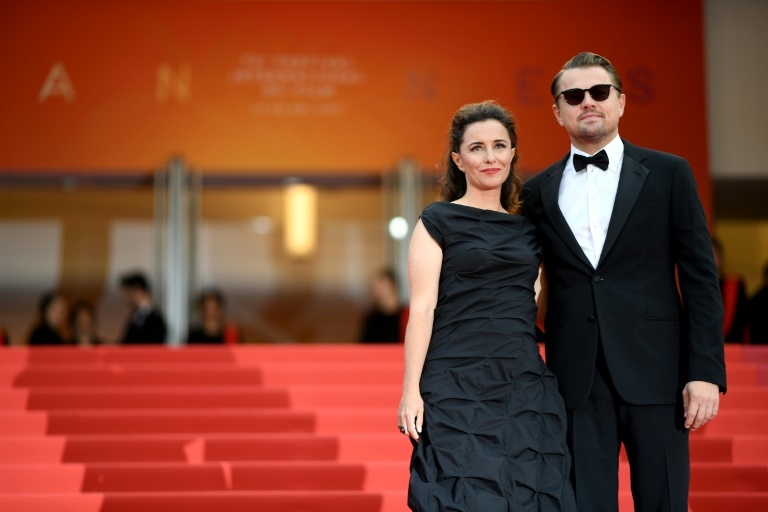Leonardo DiCaprio’s ‘Ice on Fire’ asserts climate change can be reversed

“Ice on Fire” is the latest environmental documentary by Leonardo DiCaprio and director Leila Conners, who worked together on “The 11th Hour”. Image: AFP/Loic Venance
“We don’t need advanced technology, Mother Nature has seaweeds and shellfish which sequester five times more carbon than land-based plants,” said Bren Smith, winching a glistening haul of glossy brown kelp out of the sea.
A fisherman turned “steward of the sea” who runs a restorative ocean farm growing seaweed and farming shellfish, Smith is one of the dozens of characters who appear in “Ice on Fire”, an eye-opening environmental documentary at Cannes film festival.
Produced by Hollywood star Leonardo DiCaprio and directed by Leila Conners, who worked together on the 2007 climate documentary “The 11th Hour”, the documentary offers a fascinating look at the innovations and people working to significantly reduce carbon in the atmosphere.
Take kelp. Not only does it soak up five times more carbon than plants on land, but it is also one of the fastest growing plants on earth and can be widely used for everything from food to fertilizer, even animal feed.
“If you provide a seaweed diet to cows, you get a 90% reduction in methane output,” said Smith, in what could play a key role in reducing the huge quantities of methane produced by livestock, a greenhouse gas that is 25 times more potent than carbon dioxide.
For Conners, it was learning about the properties of kelp and other innovations that provided the biggest surprise in putting the documentary together.
“If you plant kelp in 9% of global waters, you can reduce global emissions by 50%,” she told reporters in Cannes, flagging other innovations like the development of biochar (charcoal produced from plant matter) and a Swiss-made direct air capture machine.
“And that’s completely doable.”
‘There are solutions’
Even though warnings about climate catastrophe grow louder, the film argued that the world is still spending billions of dollars every year to subsidize fossil fuels that are causing the planet to overheat.
“Excess carbon creates climatic disruption, it changes the weather patterns and life support systems that society relies on to survive,” said a voiceover by DiCaprio, who has long been an environmental activist.
But the documentary goes beyond the current narrative.
“Climate change can be reversed if we act now,” DiCaprio stated.
There are two ways of doing it. Either stopping greenhouse gases entering the atmosphere or bringing carbon dioxide levels back down through photosynthesis by which carbon is extracted from the air and put back into the earth in a process known as “drawdown.” And “Ice on Fire” focuses on the latter.
“How we get out of this is by very practical action,” Conners said.
“We went to people who were practically solving this rather than just talking about it,” the American director added.
In California, enormous redwood trees that absorb more carbon than any tree on Earth, play a key role in a reforestation project that also creates biochar.
Biochar is a form of charcoal that can store carbon dioxide for long periods, enhancing soil quality and helping it retain water.
A small Swiss company has developed a “direct air capture” machine that extracts carbon dioxide from the air which can then be reused as energy.
‘We need to grow up’
“We have two stories right now. We have accelerated climate disruption because of the melting of the Arctic and we have the rapid innovation to address this problem,” Conners said. “But are we going to take these technologies to scale in time to avert the worst of what can happen?”
“There are solutions. The question is, will we use them?”
According to Conners, DiCaprio had constant input into the film’s production “giving notes, scene by scene” as well as the narration. She declined to give further detail.
And change will not cost the earth, although the price of stalling might.
“We need to grow up and become adults as human civilization. It’s like being diagnosed with a disease, you get the medicine and you say, ‘Well, I don’t really want to take it, it’s too much money,’ And you just die.”
But the main message to get across was that many people were already helping.
“There are millions of people who are solving this problem,” she said. “That’s what’s so fascinating about drawdown. It would be great if governments participated but we don’t need them necessarily. And that to me, is the first really helpful sign.” HM/JB
RELATED STORIES:
DiCaprio issues climate action call in new documentary
Obama, DiCaprio team up against climate change
DiCaprio tells leaders at UN climate signing: ‘The world is now watching’